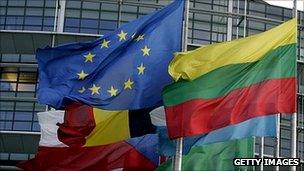EU referendum: MPs told to vote against Monday's motion
- Published
- comments

David Cameron will attend the EU debate after the date was brought forward
The three big parties at Westminster have told their MPs to vote against a motion calling for a referendum to be held on UK membership of the EU.
The Conservatives, Liberal Democrats and Labour will all ask their MPs to oppose the move at a debate on Monday.
A Tory MP is calling on his colleagues to back an amendment which would delay a referendum until the UK had renegotiated its position in the EU.
The idea is being seen as an attempt to head off a rebellion by up to 60 MPs.
The government would not be bound by the result of the vote, based on a motion by Tory MP David Nuttall, but it could prove politically tricky for the Conservative leadership.
'Country first'
Conservative MPs are expected to face a three-line whip - not yet confirmed - which would require any in government jobs to follow the party line and vote against the motion or to resign their posts.
One MP, Stewart Jackson, has already said he intends to vote for the motion even if it costs him his job as a parliamentary private secretary, saying: "Some things are more important than party preferment."
Mr Nuttall's motion calls for a referendum by May 2013 and says the public should have three options put to them in the nationwide vote - keeping the status quo, leaving the EU or reforming the terms of the UK's membership of the European Union.
David Cameron has argued he shares MPs' frustrations with the costs and bureaucracy involved in EU membership, but would oppose calls for a vote on whether to quit, saying it "is not our policy".
In response to a question from Tory backbencher Mark Pritchard on Wednesday, the PM said "the right answer is not to hold a referendum willy-nilly in this Parliament when we have so much to do to get Europe to sort its problems out."
Compromise suggested
Mr Pritchard told BBC Radio 4's Today programme he was willing to defy a three-line whip if necessary.
"This is about country first, party second and career last," he said.
Tory backbencher Mark Pritchard: "Ultimately this is about country first, party second and career last"
He added: "This is not about necessarily the terms of a particular bill... or a future referendum, it's fundamentally about freedom, it's about democracy and it's about the legitimacy of the European project."
Graham Brady, chairman of the 1922 committee of Conservative MPs, said, in an article in the Daily Telegraph, external, that "this is a backbench debate and there is no need for ministers to participate".
"What matters is that backbench MPs of all parties should be free to vote in accordance with our beliefs and in the interests of our constituents," he added.
In what is seen as an attempt to broker a compromise, Tory MP George Eustice has tabled an amendment urging the government to reconfigure its relationship with the EU - returning certain powers to Westminster - before putting the issue to the public.
Mr Eustice, David Cameron's former press secretary, said the initiative was "not yet" backed by the government but he urged MPs of all parties to support it and suggested it "more closely reflected the views" of most Conservative MPs compared to Mr Nuttall's motion.
"The advantage of having a referendum after the renegotiation rather than before is that the public would then be able to judge whether or not the government had succeeded and this would put pressure on the government to negotiate forcefully," he said.
'Collision course'
Labour leader Ed Miliband said the prospect of a referendum would create further "economic uncertainty" and urged David Cameron to "show leadership" rather than make concessions to his backbenchers.
"It (a referendum) is not the right thing for Britain," he said. "It is not the right thing for jobs. It is not the right thing for growth."
Mr Miliband's stance has been criticised by Labour MP Graham Stringer who said backbenchers should be free to vote in any way as the debate had been organised by the Commons backbench business committee rather than the government or the opposition leadership.
Mr Stringer, who says he will vote for the motion, accused all three party leaders of making a "mistake" at a time when the public were "clearly aching for a say on Europe".
"Now is the time to give people a choice about whether they want to stay in the European Union," he told the Today programme.
And the UK Independence Party, which campaigns for the UK to leave the EU, said the Conservative, Labour and Lib Dem leaders were "out of step" with the British public.
"By forcing their MPs to vote against an EU referendum, they have set them on a collision course with the electorate. It has become the people versus the politicians," their leader Nigel Farage said.
The debate has been brought forward by three days to allow Mr Cameron and Foreign Secretary William Hague to attend. They were both due to miss the original date on 27 October because of a trip to Australia for the Commonwealth Heads of Government Meeting.
The BBC's political editor Nick Robinson says the prime minister wants to be in parliament for the debate so he can look his backbenchers in the eye and tell them: "Don't do this."
A petition signed by more than 100,000 people, including Conservative and Labour MPs, calling for a referendum was handed into Downing Street last month. Members of the Commons Backbench Business Committee agreed to hold the debate on Monday.
- Published20 October 2011
- Published19 October 2011
- Published18 October 2011
- Published17 October 2011